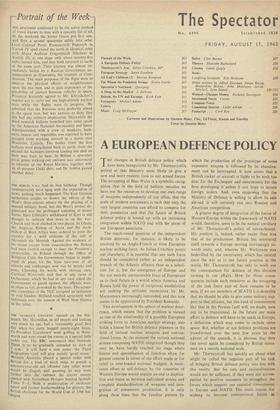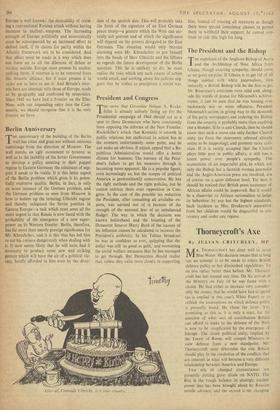A EUROPEAN DEFENCE POLICY
TRE changes in British defence policy which have been inaugurated by Mr. ThorneycroWs arrival at that Ministry seem likely to give a
new and more realistic look to our armed forces. The scrapping of Blue Water is a symbolic recog-
nition that in the field of ballistic missiles we have not the resources to develop our own range of weapons independently of our allies, that the
scale of modern armaments is such that only the very largest countries can afford to compete for their possession and that the future of British
defence policy is bound up with art increasing integration within NATO and with the plans of our European associates.
The much-vexed question of the independent British deterrent, for instance, is likely to be resolved by an Anglo-French or even European nuclear striking force. As Julian Critchley points out elsewhere, it is essential that any such force should be considered rather as an independent branch of the Atlantic alliance than as a substi- tute for it, but the emergence of Europe and the not entirely unreasonable fears of Europeans as to their future in a world where America and Russia hold the power of reciprocal annihilation are making the attitudes enunciated by Mr. Macnamara increasingly outmoded, and this now seems to be appreciated by President Kennedy.
This development in the sphere of nuclear deter- rence, which means that the problem is viewed as one of the relationship of a possible European
striking force to American nucl_ear strategy, also holds a lesson for British defence planners in the
field of tactical nuclear weapons and conven- tional forces. At the moment the various national armies composing NATO, integrated though they may be, have hardly reached the stage where fusion and specialisation of function allow for greater returns in terms of the effort made or for
relief to over-loaded national budgets. A maxi- mum effort at self-defence by the countries of Western Europe would require an end to duplica-
tion and waste as between individual armies and complete standardisation of weapons and inte- gration of armaments production. It is only along these lines that the familiar pattern by
which the production of the prototype of some expensive weapon is followed by its abandon- ment can be interrupted. It now seems that a British rocket or aircraft is liable to be both too dear for the Exchequer and uneconomic for the
firm developing it unless it can hope to secure foreign orders. And, even supposing that the Ministry of Defence is willing to allow its sate abroad, it will certainly run into Russian and American competition.
A greater degree of integration of the forces of Western Europe within the framework of NATO would, therefore, seem to be the natural corollary of Mr. Thorneycroft's policy of retrenchment. His position is, indeed, rather easier than was that of his predecessor. Britain has orientated itself towards a Europe moving increasingly to- wards unity, and, whereas Mr. Watkinson was bedevilled by the uncertainty which has existed since the war as to our future position in the world, Mr. Thorneycroft has only to work out the consequences for defence of this decisive turning in our affairs. How far those conse- quences include such measures as the scrapping of the task force east of Suez remains to be seen. If we are members of SEATO it is desirable that we should be able to give some military sup- port to that alliance, but this kind of commitment like that in the Persian Gulf will, no doubt, turn out to be transitional. In the future our main effort in defence will have to be made in Europe, a definition which may come to include ohter space. But, whether or not defence problems are transformed over the next few years by the advent of the sputnik, it is obvious that they can never again be considered by British states- men on a merely national scale.
Mr. Thorneycroft has quickly set about what might be called the negative part of his task of bringing British defence policy into line with this reality. But his cuts and rationalisations would not be sufficient, if they were not accom- panied by positive measures to strengthen the forces which support our essential commitment to Europe and NATO. The main reason for wishing to increase conventional forces in Europe is well known: the desirability of resist- ing a conventional Russian attack without having recourse to nuclear ,weapons. The increasing strength of Europe politically and economically must be accompanied by an increased effort to defend itself, if its claims for parity within the Atlantic framework are to be considered. And that effort must be made in a way which does not force on us all the dilemma of defeat or nuclear suicide. Europe must possess its nuclear striking force, if mistrust is to be removed from the Atlantic alliance, but it must possess it in order not to have to use it. And Britain's inter- ests here are identical with those of Europe, made so by geography and confirmed by economics. Since 1945 we have had a frontier on the Elbe. Now, with our impending entry into the Com- munity, we should recognise that it is the only frontier we have.































 Previous page
Previous page